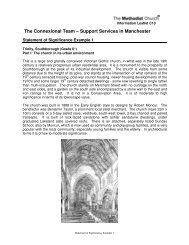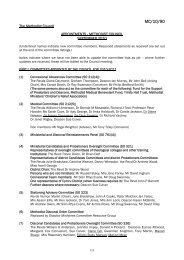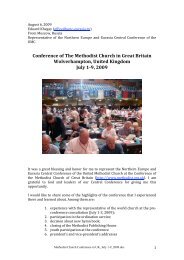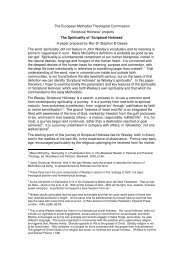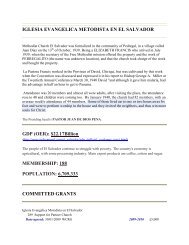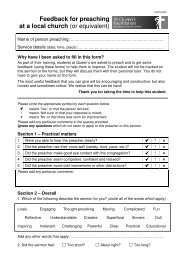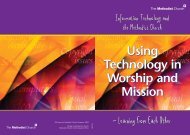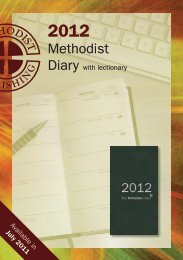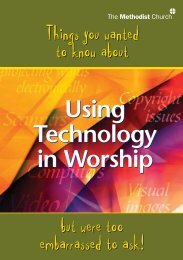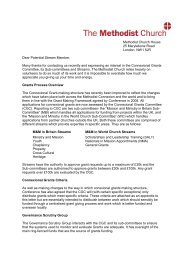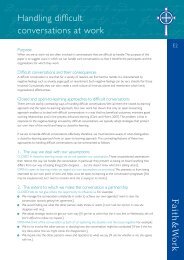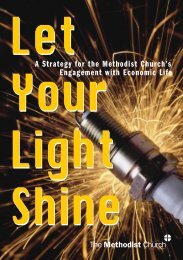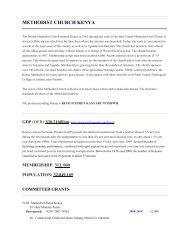Discipleship and the people called Methodists - BEH District
Discipleship and the people called Methodists - BEH District
Discipleship and the people called Methodists - BEH District
You also want an ePaper? Increase the reach of your titles
YUMPU automatically turns print PDFs into web optimized ePapers that Google loves.
individually <strong>and</strong> corporately. Its roots shaped a movement that simply didn’t feel<br />
comfortable when ‘religious’ bits of discipleship were separated from ‘secular’ or<br />
‘social’ bits. Methodist discipleship has <strong>the</strong>refore always meshed toge<strong>the</strong>r morning<br />
devotions, visiting folk, witnessing clearly to Christ at work <strong>and</strong> home through lives<br />
<strong>and</strong> lips, joining a campaign to cancel developing nations’ debt, before attending<br />
a time of worship with a fine supper afterwards!<br />
What works of mercy are most pressing <strong>and</strong> required by Christian disciples<br />
today?<br />
Constancy <strong>and</strong> change<br />
The ‘three simple rules’ are a real gift of God to <strong>Methodists</strong> because <strong>the</strong>y continue<br />
to provide a contextual <strong>and</strong> helpful way of being better disciples today. Do no<br />
harm, do good <strong>and</strong> love God are guiding lights applicable in all times <strong>and</strong> places.<br />
How <strong>the</strong>se are lived out involves both constancy <strong>and</strong> change. Some things<br />
remain constant. For example not stealing or murdering, <strong>and</strong> praying <strong>and</strong> sharing<br />
in <strong>the</strong> Lord’s Supper are as right now as <strong>the</strong>y were 0 years ago. We should<br />
note though that when something is constant it doesn’t mean it’s unchanged.<br />
The ways of praying <strong>and</strong> sharing Holy Communion today are various <strong>and</strong> hugely<br />
nourishing <strong>and</strong> it may be that <strong>the</strong> spiritual staleness some of us experience<br />
lies in mistaking constancy for things remaining unchanged. Constancy is about<br />
receiving from God so as to be nourished, not thinking that ‘it’s just bread <strong>and</strong><br />
wine again’!<br />
O<strong>the</strong>r expressions of <strong>the</strong> rules change more profoundly over time. But very<br />
much alive is whe<strong>the</strong>r as Christian disciples we should be counter cultural <strong>and</strong><br />
believe in honesty as an absolute virtue (‘Your “Yes” shall be Yes‘ as Jesus said)<br />
or join in <strong>the</strong> pervading assumption that dishonesty is acceptable provided you are<br />
not found out. ‘Doing no harm’ <strong>and</strong> ‘doing good’ today almost certainly includes<br />
actions <strong>and</strong> commitments that couldn’t be known by early <strong>Methodists</strong>. Email<br />
etiquette perhaps, or <strong>the</strong> use of <strong>the</strong> internet, ending world poverty, or a lifestyle<br />
that signals <strong>the</strong> seriousness with which we want to care for God’s planet <strong>and</strong> its<br />
fragile climate. In every time <strong>and</strong> place <strong>the</strong>re will be apt expressions of Christian<br />
faith, <strong>and</strong> <strong>the</strong>se will be measures of our commitment to being better disciples<br />
of Christ. Identifying what <strong>the</strong>se ‘apt expressions’ are in <strong>the</strong> early twenty first<br />
9



